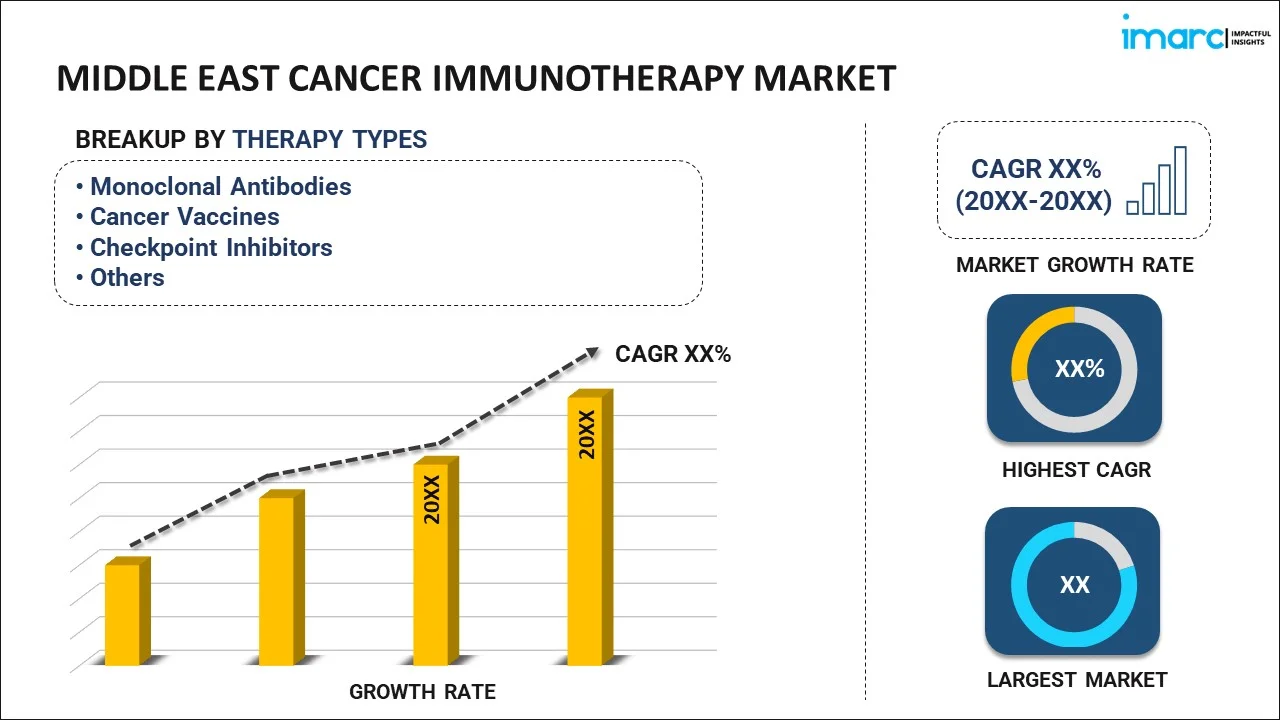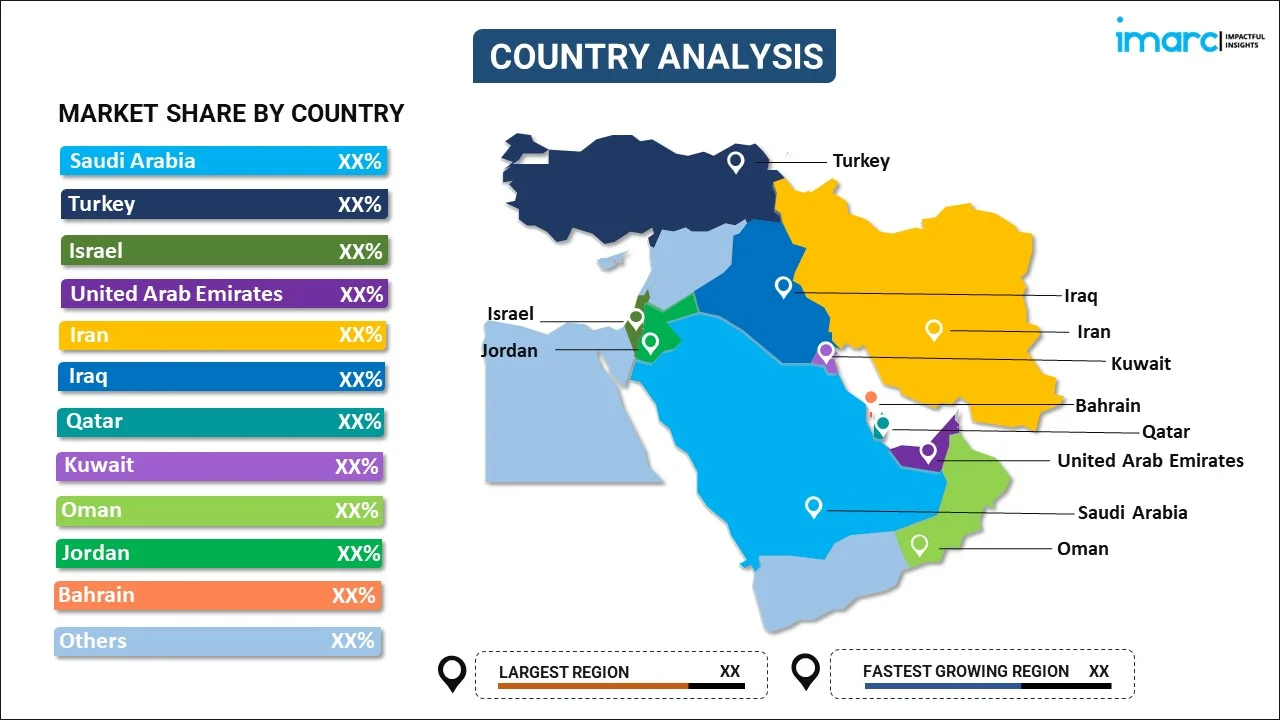
Middle East Cancer Immunotherapy Market Report by Therapy Type (Monoclonal Antibodies, Cancer Vaccines, Checkpoint Inhibitors, Immunomodulators, and Others), Application (Lung Cancer, Breast Cancer, Colorectal Cancer, Melanoma, Prostate Cancer, Head and Neck Cancer, and Others), End User (Hospitals, Cancer Research Centers, Clinics, and Others), and Country 2026-2034
Market Overview:
Middle East cancer immunotherapy market size reached USD 5.6 Billion in 2025. Looking forward, IMARC Group expects the market to reach USD 14.4 Billion by 2034, exhibiting a growth rate (CAGR) of 11.08% during 2026-2034. The inflating need for enhanced procedures to treat various cancers, including lung, breast, colorectal, melanoma, prostate, head and neck, thyroid, kidney, liver, cervical, bladder, ovarian, and skin, is primarily bolstering the market growth.
|
Report Attribute
|
Key Statistics
|
|---|---|
|
Base Year
|
2025
|
|
Forecast Years
|
2026-2034
|
|
Historical Years
|
2020-2025
|
|
Market Size in 2025
|
USD 5.6 Billion |
|
Market Forecast in 2034
|
USD 14.4 Billion |
| Market Growth Rate 2026-2034 | 11.08% |
Access the full market insights report Request Sample
Cancer is a medical condition characterized by the uncontrolled growth and dissemination of certain cells in the body, impacting various organs. The development of cancer can be attributed to factors such as alcohol or tobacco consumption, an unhealthy diet, exposure to air pollution, and physical inactivity. It gives rise to serious health complications, including anxiety, depression, the fear of mortality, pain, stress, and suicidal thoughts in affected individuals. Immunotherapy, a treatment approach involving antibodies that bind to and hinder the function of proteins expressed by cancer cells, is a viable method for addressing cancer. This form of therapy aims to enhance the immune system's ability to recognize and eliminate abnormal cancer cells. Notably, cancer immunotherapy offers advantages such as reduced side effects compared to alternative treatments and a decreased likelihood of cancer recurrence.
Middle East Cancer Immunotherapy Market Trends:
The Middle East cancer immunotherapy market is witnessing significant growth and transformation, reflecting a progressive shift in the region's approach to cancer treatment. This is a groundbreaking method in the field of oncology, which involves the use of antibodies to inhibit the function of proteins expressed by cancer cells, thereby activating the immune system to recognize and eliminate these abnormal cells. Additionally, this innovative approach offers distinct advantages, including fewer side effects compared to traditional treatments and a reduction in the recurrence of cancer cells. Besides this, the Middle East, with a growing awareness of advanced medical interventions, has embraced cancer immunotherapy as a critical component in the treatment landscape. Moreover, immunotherapy is gaining prominence in addressing various cancer types prevalent in the region, such as lung, breast, colorectal, melanoma, prostate, head and neck, thyroid, kidney, liver, cervical, bladder, ovarian, and skin cancers. As the Middle East witnesses increased investments in healthcare infrastructure, collaborations between research institutions and pharmaceutical companies, and a rising emphasis on personalized medicine, the cancer immunotherapy market is poised for continued expansion. This signifies a positive trend toward more effective and targeted cancer treatments, contributing to improved patient outcomes and quality of life across the Middle East, which is expected to fuel the market growth over the forecasted period.
Middle East Cancer Immunotherapy Market Segmentation:
IMARC Group provides an analysis of the key trends in each segment of the market, along with forecasts at the regional and country levels for 2026-2034. Our report has categorized the market based on therapy type, application, and end user.
Therapy Type Insights:

To get detailed segment analysis of this market Request Sample
- Monoclonal Antibodies
- Cancer Vaccines
- Checkpoint Inhibitors
- Immunomodulators
- Others
The report has provided a detailed breakup and analysis of the market based on the therapy type. This includes monoclonal antibodies, cancer vaccines, checkpoint inhibitors, immunomodulators, and others.
Application Insights:
- Lung Cancer
- Breast Cancer
- Colorectal Cancer
- Melanoma
- Prostate Cancer
- Head and Neck Cancer
- Others
A detailed breakup and analysis of the market based on the application have also been provided in the report. This includes lung cancer, breast cancer, colorectal cancer, melanoma, prostate cancer, head and neck cancer, and others.
End User Insights:
- Hospitals
- Cancer Research Centers
- Clinics
- Others
The report has provided a detailed breakup and analysis of the market based on the end user. This includes hospitals, cancer research centers, clinics, and others.
Country Insights:

To get detailed regional analysis of this market Request Sample
- Saudi Arabia
- Turkey
- Israel
- United Arab Emirates
- Iran
- Iraq
- Qatar
- Kuwait
- Oman
- Jordan
- Bahrain
- Others
The report has also provided a comprehensive analysis of all the major regional markets, which include Saudi Arabia, Turkey, Israel, United Arab Emirates, Iran, Iraq, Qatar, Kuwait, Oman, Jordan, Bahrain, and Others.
Competitive Landscape:
The market research report has also provided a comprehensive analysis of the competitive landscape in the market. Competitive analysis such as market structure, key player positioning, top winning strategies, competitive dashboard, and company evaluation quadrant has been covered in the report. Also, detailed profiles of all major companies have been provided.
Middle East Cancer Immunotherapy Market Report Coverage:
| Report Features | Details |
|---|---|
| Base Year of the Analysis | 2025 |
| Historical Period | 2020-2025 |
| Forecast Period | 2026-2034 |
| Units | Billion USD |
| Scope of the Report | Exploration of Historical and Forecast Trends, Industry Catalysts and Challenges, Segment-Wise Historical and Predictive Market Assessment:
|
| Therapy Types Covered | Monoclonal Antibodies, Cancer Vaccines, Checkpoint Inhibitors, Immunomodulators, Others |
| Applications Covered | Lung Cancer, Breast Cancer, Colorectal Cancer, Melanoma, Prostate Cancer, Head and Neck Cancer, Others |
| End Users Covered | Hospitals, Cancer Research Centers, Clinics, Others |
| Countries Covered | Saudi Arabia, Turkey, Israel, United Arab Emirates, Iran, Iraq, Qatar, Kuwait, Oman, Jordan, Bahrain, Others |
| Customization Scope | 10% Free Customization |
| Post-Sale Analyst Support | 10-12 Weeks |
| Delivery Format | PDF and Excel through Email (We can also provide the editable version of the report in PPT/Word format on special request) |
Key Questions Answered in This Report:
- How has the Middle East cancer immunotherapy market performed so far and how will it perform in the coming years?
- What has been the impact of COVID-19 on the Middle East cancer immunotherapy market?
- What is the breakup of the Middle East cancer immunotherapy market on the basis of therapy type?
- What is the breakup of the Middle East cancer immunotherapy market on the basis of application?
- What is the breakup of the Middle East cancer immunotherapy market on the basis of end user?
- What are the various stages in the value chain of the Middle East cancer immunotherapy market?
- What are the key driving factors and challenges in the Middle East cancer immunotherapy?
- What is the structure of the Middle East cancer immunotherapy market and who are the key players?
- What is the degree of competition in the Middle East cancer immunotherapy market?
Key Benefits for Stakeholders:
- IMARC’s industry report offers a comprehensive quantitative analysis of various market segments, historical and current market trends, market forecasts, and dynamics of the Middle East cancer immunotherapy market from 2020-2034.
- The research report provides the latest information on the market drivers, challenges, and opportunities in the Middle East cancer immunotherapy market.
- Porter's five forces analysis assist stakeholders in assessing the impact of new entrants, competitive rivalry, supplier power, buyer power, and the threat of substitution. It helps stakeholders to analyze the level of competition within the Middle East cancer immunotherapy industry and its attractiveness.
- Competitive landscape allows stakeholders to understand their competitive environment and provides an insight into the current positions of key players in the market.
Need more help?
- Speak to our experienced analysts for insights on the current market scenarios.
- Include additional segments and countries to customize the report as per your requirement.
- Gain an unparalleled competitive advantage in your domain by understanding how to utilize the report and positively impacting your operations and revenue.
- For further assistance, please connect with our analysts.
 Request Customization
Request Customization
 Speak to an Analyst
Speak to an Analyst
 Request Brochure
Request Brochure
 Inquire Before Buying
Inquire Before Buying




.webp)




.webp)












